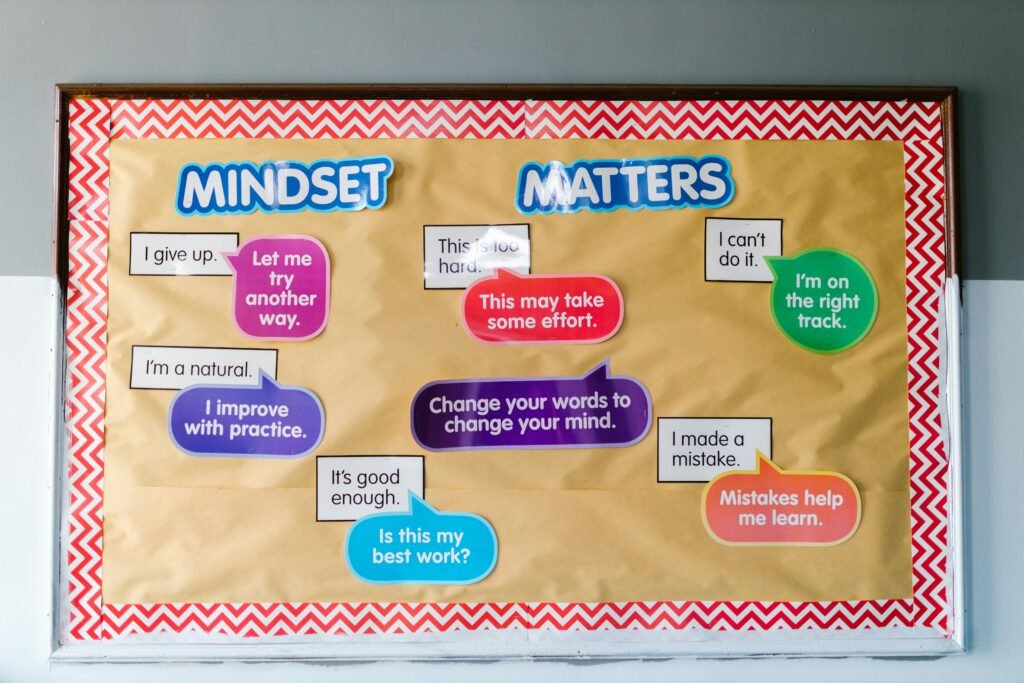
Introduction to Growth Mindset
Developing a growth mindset is life-changing for anyone aiming to enhance personal growth and self-improvement.
At its core, a growth mindset is the belief that your abilities and intelligence can be developed through dedication and hard work.
This perspective is empowering and can lead to significant progress in various aspects of life.
The concept of a growth mindset was popularized by psychologist Carol Dweck, who contrasted it with a fixed mindset.
While a fixed mindset assumes that our traits are static and unchangeable, a growth mindset embraces the idea that we can evolve and grow through effort and perseverance.
This mindset fosters a love for learning and the resilience needed to overcome obstacles, both of which are essential for achieving any meaningful goal.
Consider this: when you encounter a new challenge, how do you react?
Do you shy away, fearing failure, or do you see it as an opportunity to learn something new?
People with a growth mindset are more likely to embrace challenges, viewing them as a pathway to improvement.
This proactive attitude not only makes tasks more enjoyable but also turns setbacks into valuable learning experiences.
It’s important to recognize that developing a growth mindset is an ongoing process.
It’s not something you achieve overnight. Instead, it’s about making a conscious effort to shift your perspective.
For example, when faced with criticism, instead of feeling disheartened, see it as constructive feedback that can help you improve.
Understand that effort, not just innate talent, is crucial for success.
By appreciating the learning journey rather than focusing solely on the end result, you nurture a more sustainable and rewarding approach to personal and professional development.
Cultivating a growth mindset means constantly seeking ways to learn and grow, asking questions that challenge your understanding, and reflecting on your experiences to gain new insights.
Through this mindset, you’ll discover that your potential is far greater than you ever imagined.
Embrace Challenges

Viewing challenges as opportunities to learn is a cornerstone of a growth mindset.
When you face a difficult task, approach it with the mindset that it is a chance to develop new skills.
For instance, learning a new language or taking on a challenging project at work can push you out of your comfort zone, leading to personal and professional growth.
By tackling these difficult tasks head-on, you not only expand your abilities but also boost your confidence.
When it comes to physical challenges, think about athletes who push their limits to achieve new personal bests.
Training for a marathon or mastering a complex dance routine requires not just physical stamina but also mental strength.
Athletes understand that each obstacle is a step towards improvement, not a barrier to success.
In the academic realm, students who embrace challenging subjects often find that their understanding deepens over time.
A student who struggles with math, for example, can benefit greatly from viewing each problem as a learning opportunity rather than a roadblock.
This shift in perspective can lead to significant academic achievements and a more positive attitude towards learning.
In your personal life, taking on challenges can also mean stepping into unfamiliar social situations or trying new hobbies.
Joining a new club or learning to play a musical instrument can be daunting at first, but these experiences enrich your life and broaden your horizons.
Even in professional settings, embracing challenges can lead to unexpected growth.
Taking on a project that seems beyond your current capabilities can be intimidating.
However, by breaking it down into manageable steps and seeking out resources and support, you can not only complete the project but also gain new skills and insights that will benefit you in future endeavors.
Each challenge you encounter is an opportunity to stretch your abilities, learn something new, and build resilience.
Adopting this perspective can make even the most daunting tasks seem like achievable goals.
Learn from Criticism

Feedback is an invaluable tool for improvement, especially when it is constructive.
Carol Dweck emphasizes the importance of providing students with positive reinforcement and constructive feedback rather than just praising their effort.
This kind of meaningful feedback helps them improve significantly.
Consider the story of Walt Disney, who was once fired from a newspaper for “lacking imagination.”
Instead of giving up, Disney used the criticism to fuel his determination and went on to create one of the most successful entertainment empires in history.
Constructive criticism can serve as a guide for identifying areas that need improvement.
Rather than taking feedback personally, view it as an opportunity to refine your skills and broaden your understanding.
This shift in perspective can transform criticism from a perceived setback into a valuable learning moment.
When receiving feedback, it’s essential to listen actively and openly.
This means focusing on the content of the feedback rather than the delivery.
By doing so, you can extract actionable insights that will help you grow.
For instance, if a colleague points out that your presentation lacked clarity, take it as an opportunity to enhance your communication skills rather than feeling disheartened.
It’s also helpful to seek feedback proactively.
Regularly ask for input from trusted mentors, peers, or supervisors.
This not only shows your commitment to personal growth but also provides diverse perspectives that can enrich your learning experience.
Additionally, offering constructive feedback to others can further enhance your own understanding and foster a collaborative environment.
Remember that even the most successful individuals have faced criticism and used it to their advantage.
Embracing feedback with a positive attitude can pave the way for significant personal and professional development.
Persist in the Face of Setbacks

Persistence is a key ingredient when striving for success, especially in the face of setbacks.
Thomas Edison once remarked, “I have not failed.
I’ve just found 10,000 ways that won’t work,” highlighting his relentless perseverance in inventing the electric light bulb.
This attitude is essential for overcoming obstacles and achieving long-term goals.
When you encounter setbacks, it’s helpful to reframe them as learning opportunities.
Each setback provides valuable lessons that can guide your future efforts.
For instance, if a business proposal is rejected, analyze the feedback and identify areas for improvement.
This approach not only helps you refine your skills but also builds resilience.
Breaking your goals into smaller, more manageable tasks can make them less overwhelming.
Celebrate small victories along the way to maintain motivation.
Achieving these smaller milestones can provide the encouragement needed to keep pushing forward, even when the going gets tough.
Building a supportive network is another effective strategy.
Surround yourself with individuals who encourage and uplift you during challenging times.
Whether it’s friends, family, or colleagues, having a support system can provide the emotional backing and practical advice needed to stay on track.
Consider the story of J.K. Rowling, who faced numerous rejections before her Harry Potter series was finally published.
Her determination and belief in her work kept her going, ultimately leading to worldwide success.
This example underscores the importance of persistence and the ability to keep moving forward despite setbacks.
It’s also beneficial to develop a routine that promotes resilience.
Regularly engaging in activities that reduce stress and enhance well-being, such as exercise, meditation, or hobbies, can fortify your ability to persist.
By maintaining a balanced lifestyle, you’re better equipped to handle setbacks with a clear mind and renewed energy.
Persisting through setbacks is not about avoiding failure but about learning, adapting, and continuing the journey toward your goals.
Value Effort Over Talent

When it comes to achieving greatness, effort often outweighs raw talent.
History is filled with examples of individuals who, despite not being the most naturally gifted, achieved remarkable success through sheer hard work and determination.
Take Michael Jordan, for example.
Cut from his high school basketball team, he could have easily given up.
Instead, he dedicated himself to rigorous practice and relentless improvement.
His story is a testament to how sustained effort can surpass innate talent, leading to extraordinary accomplishments.
In the workplace, we frequently see that those who invest consistent effort and show dedication are the ones who advance and excel.
Talent may open doors, but it’s the effort you put into your work that builds a reputation for reliability and competence.
Employers often value employees who show persistence and a willingness to learn, as these traits indicate long-term potential for growth and contribution to the organization.
In academic settings, students who may not be naturally inclined towards certain subjects can still achieve high levels of understanding and performance through persistent study and practice.
For instance, a student struggling with mathematics can overcome their difficulties by dedicating extra time to problem-solving and seeking additional help.
Over time, this effort can lead to a mastery of the subject that might have seemed unattainable at first.
Effort is also crucial in personal development.
Learning a new skill, such as playing an instrument or mastering a new language, requires sustained practice and commitment.
While some may have a natural affinity for these activities, anyone can achieve proficiency through regular and focused effort.
By consistently prioritizing effort over talent, you cultivate resilience and a work ethic that can propel you to new heights.
Each small, incremental improvement adds up, eventually leading to significant progress and success.
Focus on the Process, Not Just the Outcome

Concentrating on the journey rather than just the destination is crucial for maintaining motivation and fostering a growth mindset.
When you fixate solely on outcomes, you can easily become discouraged if things don’t go as planned.
However, by focusing on the process, you gain valuable insights and experiences that contribute to long-term success.
Consider an artist working on a painting.
The final piece is important, but the skills developed, techniques learned, and creative decisions made during the process are equally valuable.
This same principle applies to any endeavor.
Whether you’re working on a major project at work, training for a marathon, or learning a new instrument, paying attention to the steps involved can make the experience more enriching and rewarding.
In professional settings, breaking a large project into smaller tasks allows you to celebrate incremental progress, which keeps you motivated.
For example, if you’re working on a year-long marketing campaign, recognize and appreciate the milestones achieved along the way, such as completing research or launching a pilot program.
Academically, students benefit from engaging deeply with the material rather than just aiming for high grades.
When students immerse themselves in the learning process—participating in discussions, doing extra readings, and exploring related topics—they develop a more profound understanding of the subject matter, which ultimately leads to better performance.
In your personal life, this principle can be applied to hobbies and new skills.
If you’re learning to cook, savor the experimentation and the learning that comes from trial and error, rather than stressing about creating a perfect dish every time.
By embracing the process, you not only make the experience more enjoyable but also build a more resilient and adaptive mindset, setting yourself up for sustained personal growth.
Cultivate Curiosity

Curiosity drives personal growth by encouraging you to explore new ideas and experiences.
To cultivate curiosity, start by asking questions that challenge your understanding and inspire learning.
For instance, questions like “Why is this the case?” or “What if things were different?” can lead to new insights and understanding.
Embrace this sense of wonder, and you’ll find yourself continually evolving and expanding your knowledge.
One effective way to nurture curiosity is to diversify your sources of information.
Read books on different subjects, watch documentaries, or listen to podcasts that explore various fields.
This approach broadens your perspective and often sparks new interests.
Engage in conversations with people who have different viewpoints or expertise.
This not only enhances your understanding but also challenges your preconceived notions.
Ask open-ended questions during these discussions to gain deeper insights and stimulate further curiosity.
Another method to foster curiosity is to allow yourself the freedom to explore topics without a specific goal in mind.
Sometimes, the best learning happens when you’re not trying to achieve something concrete but are simply indulging your interest.
Additionally, keep a curiosity journal.
Jot down questions that pop into your mind throughout the day and make it a point to research the answers.
This practice not only satisfies immediate curiosity but also develops a habit of continuous inquiry.
Lastly, embrace a mindset that sees uncertainty as an opportunity rather than a threat.
When faced with something you don’t understand, view it as a chance to learn rather than a gap in your knowledge.
This attitude keeps you open to new experiences and fuels your drive to discover more.
Reflect on Learning Experiences

Regular self-reflection is essential for continuous improvement and fostering a growth mindset.
By taking time to assess your experiences, you gain valuable insights that can guide your future actions.
Start by setting aside a few minutes each day or week to journal about your recent experiences.
Write down what went well, what didn’t, and what you learned from these situations.
This practice helps you pinpoint areas for growth and recognize patterns in your behavior that either support or hinder your progress.
When reflecting, consider asking yourself specific questions. For instance, “What did I do that contributed to my success?” or “What could I have done differently in that situation?”
These questions encourage deeper thinking and provide actionable insights that you can apply moving forward.
It’s also beneficial to think about how your mindset influenced the outcome.
Did you approach a challenge with a positive attitude, or did you let self-doubt hold you back?
Reflecting on feedback you’ve received is another critical aspect.
Review constructive criticism with an open mind and think about how you can implement the suggestions to improve your skills or approach.
This not only helps you grow but also reinforces the value of feedback in your personal development journey.
Additionally, consider discussing your reflections with a mentor or a trusted friend.
Sometimes, talking through your thoughts with someone else can offer new perspectives and further clarity.
These conversations can also provide additional support and encouragement, helping you stay committed to your growth.
By regularly engaging in self-reflection, you make learning an integral part of your routine, ensuring that you are always moving forward on your path to personal and professional development.
Conclusion: The Journey to a Growth Mindset

Developing a growth mindset is a rewarding journey that unfolds through continuous effort and reflection.
Embrace each challenge as a chance to learn, and view setbacks not as failures but as stepping stones towards growth.
The key is to appreciate the learning process and recognize that sustained effort can lead to significant achievements.
Regularly seeking and reflecting on feedback will help you identify areas for improvement, making you more resilient and adaptable.
Cultivating curiosity will drive you to explore new ideas and expand your knowledge.
By incorporating these principles into your daily routine, you’ll foster a mindset that supports ongoing personal and professional development.
Stay committed to this path, and watch as your potential unfolds.
